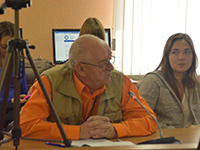International Conference of Altai Political Research School was held at ASU
The tradition of organizing such conferences, dedicated to relevant problems of international relations and political life, has been held up by Altai Political Research School since 1996. Scientists from 18 countries and more that 60 Russian cities have already taken part in discussions. Introductory discussions have been held on the Internet since 2002.
This year 42 reports in Russian and English from 16 cities of Russia (Armavir, Barnaul, Biysk, Blagoveshchensk, Vladivostok, Vologda, Yekaterinburg, Kaluga, Kemerovo, Kirov, Krasnodar, Moscow, Nizhnevartovsk, Novosibirsk, Pskov, Stavropol) and 4 foreign countries (Armenia, Kazakhstan, Canada and Ukraine) were submitted to the online conference.
In-person conference was organized by Altai Political Research School, Department of World History and International Relations, Altai Krai Intelligentsia Congress and Russian Association of Political Science. There the participants discussed the topic, which had been brought up at online conference. More than 70 people (geographers, historians, international relations experts, political scientists and area studies specialists) have taken part in the conference during 2 days.
Head of the Department of World History and International Relations, director of Altai Political Research School, Professor Yu.G. Chernyshov delivered a welcoming speech and opened the conference. He noted that the problem of separatism had become extremely relevant in recent 10 years due to appearance of new tension spots in the modern world. It is necessary to deepen research of the character and sources of this phenomenon, to combine historical and modern experience, to interdisciplinary approaches. This is why the organizers tried summarizing the existing theoretical studies in this field, specifying the essence on key ideas, studying the role of separatism in global politics, analyzing international experience and used methods of separative problem solution, exploring acts of separatism on the post-Soviet territory, focusing on problems faced by the Russian Federation. Thus, the conference program comprised three workshops:
- Separatism: main theoretical approaches.
- International experience: national and territorial repartition of the world and its global consequences.
- Separatism on the post-Soviet territory.
At the conference opening ceremony vice rector for international affairs development R.I. Raikin and co-director of Asian Expert-Analytical Center of Ethnology and International Educational Cooperation P.K. Dashkovskiy took the floor. Further, specialists T. Rocky (Toronto, Canada), G.P. Grigoryan (Erevan, Armenia), A.N. Kharin (Kirov, Russia) and O.Ch. Reut (Petrozavodsk, Russia) delivered their reports at the web-seminar. Then the participants discussed general problems of separatism and listened to experts from Barnaul O.A. Arshintseva, O.Yu. Kurnykina, A.M. Betmakaeva, A.V. Krotova (lecturers of ASU geographical and historical faculties) speaking. The majority of reports were devoted to analysis of specific acts of separatism in the history of Western (P.V. Ulianov, L.V. Monina, S.N. Isakova, A.V. Skovorodnikov, N.Yu. Samoilov, N.S. Malysheva) and Eastern (S.A. Usoltsev, V.S. Boiko, D.A. Glazunov) countries. The specialists considered a variety of matters: from religious factors of Judaical separatism in anti-Roman revolt of 66–70 AD to contemporary separatist movements in the Balkans, Northern Ireland, Afghanistan and China. The participants discussed not only particular events, but also lessons that could be drawn from this historical experience.
The second conference day began with speeches by Novosibirsk guests S.V. Kozlov and A.M. Barsukov, who represented the Faculty of Politics and International Relations at Siberian Institute of Management. Their reports about political rhetoric of President of Ukraine Petr Poroshenko and activities of ethnoregional parties in modern Europe arouse strong interest of the audience. Representatives of Kazakhstan T.S. Mizimbaev and Zh.M. Moldagazinova informed the participants about ethnopolitical processes that had taken place in their country in the 20th century. Forming of Rusyns’ national identity was touched by V.N. Kozulin.
The meeting of Russian Association of Political Science members was also conducted in the framework of the conference. The association gave information on work of regional branch and chose a delegate for the conference of Russian Association of Political Science, which is to be held in November.
At the end of the conference the participants noted that the discussion had turned out to be quite fruitful and could be applied practically. They also decided to publish the conference materials in the form of the 32nd issue of Altai Political Research School Journal (it is a serial publication listed in RSCI and posted on eLibrary.ru). The participants chose the topic for discussion at the conference next year, it will be “Image of the country as a factor of soft power in international relations”. The organizing committee expressed its gratitude to the guests, ASU Scientific Library workers and everyone who helped organize the conference.











